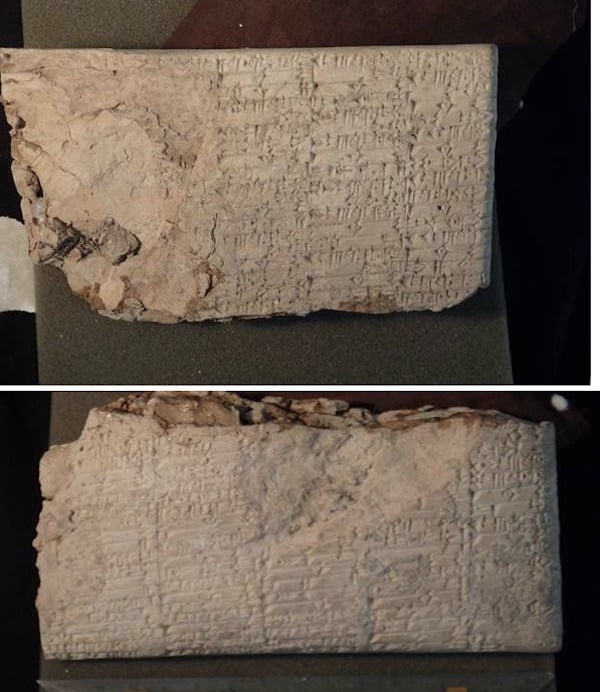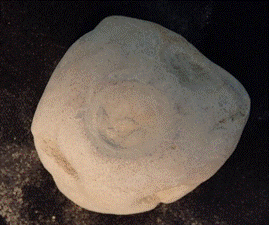Law & Politics
Did Hobby Lobby Buy Up Iraqi War Loot in Its Quest to Amass Biblical Artifacts?
The evangelical-owned household goods company has been forced to surrender thousands of artifacts and pay a $3 million fine.

The evangelical-owned household goods company has been forced to surrender thousands of artifacts and pay a $3 million fine.

Eileen Kinsella

Hobby Lobby, nationwide arts and crafts chain owned by an evangelical Christian family, professes a mission of “honoring the Lord in all we do by operating the company in a manner consistent with Biblical principles.” In 2010, the company, which will open a Museum of the Bible in Washington, DC later this year, spent $1.6 million on thousands of ancient artifacts in an effort to amass a trove of Biblical antiquities.
But a US Department of Justice civil action filed on July 5 outlines a years-long, willful pattern of smuggling Iraqi artifacts into the US despite numerous warnings, interceptions, and large-scale purchases that were “fraught with red flags.”
Hobby Lobby is owned by David Green and his family. Founded in 1972, the Oklahoma City-based, nationwide chain has some 600 stores and is valued at $4 billion, according to Forbes.
The company says it is cooperating with the Department of Justice.
“We should have exercised more oversight and carefully questioned how the acquisitions were handled,” Hobby Lobby President Steve Green said in a statement on the company’s website. “Hobby Lobby has cooperated with the government throughout its investigation, and with the announcement of today’s settlement agreement, is pleased the matter has been resolved.”
News of a possible investigation was first reported nearly two years ago. At the time, a representative for the museum chalked up the problem to “improper” or “incomplete” paperwork.
According to the Department of Justice’s statement, Green had the fragile tablets shipped via FedEx to Hobby Lobby retail stores with shipping labels that falsely described the cuneiform tablets as tile samples. The statement was released by the US Attorney’s Office for the Eastern District of New York and is signed by acting United States Attorney Bridget M. Rohde and Assistant US Attorney Karin Orenstein.

Cuneiform tablets attached as exhibits to the Department of Justice civil complaint. Courtesy US Department of Justice.
In a legal technicality, Hobby Lobby is not named as a defendant in the 25-page civil complaint. The “defendants” are listed as approximately 450 ancient cuneiform tablets and approximately 3,000 ancient clay bullae, the latter of which are balls of clay on which seals have been imprinted.
As part of yesterday’s filing, the Department of Justice filed a settlement with Hobby Lobby in which the company agreed to forfeit the artifacts named in the complaint, roughly 144 cylinder seals, and an additional sum of $3 million to resolve the civil action. It is unclear if any further civil or criminal charges are pending. A spokesman for the Department of Justice told artnet News that it is “not our policy to explain internal thinking or decisions.”
Art law expert Nicholas M. O’Donnell, a partner in the law firm Sullivan & Worcester, commented on the issue of criminal charges in an email to artnet News. “I am very surprised there is no criminal case here,” he said. “Falsely labeled goods and smuggling have very severe criminal penalties available to the government, which believed it had enough evidence to make very specific allegations about the actions of individual people (at a time after the company had apparently received expert advice about best practices). It is possible that criminal charges may still follow, but I’d expect that the company would not have stipulated without an assurance that the case was over.” O’Donnell has just published the book A Tragic Fate: Law and Ethics in the Battle Over Nazi-Looted Art, available from the publishing arm of the American Bar Association.

An ancient clay bulla that is part of the Department of Justice’s complaint. Courtesy Department of Justice.
The complaint lays out the smuggling activity—which appears to have gone on for years despite warnings—in detail.
Around 2009, Hobby Lobby began assembling a collection of historically significant manuscripts, antiquities, and other cultural materials. Company president Green traveled with a consultant to the United Arab Emirates (UAE) in 2010 to inspect a large number of antiquities being offered for sale.
The complaint notes that during the inspection, at which several Israeli dealers and a dealer from the UAE were present, “the artifacts were displayed informally—spread on the floor, arranged in layers on a coffee table, and packed loosely in cardboard boxes, in many instances with little or no protective material between them.”
The consultant immediately noted that the company might run afoul of the law by importing the artifacts.
“In October 2010, an expert on cultural property law retained by Hobby Lobby warned the company that the acquisition of cultural property likely from Iraq, including cuneiform tablets and cylinder seals, carries a risk that such objects may have been looted from archaeological sites in Iraq. The expert also advised Hobby Lobby to review its collection of antiquities for any objects of Iraqi origin and to verify that their country of origin was properly declared at the time of importation into the United States. The expert warned Hobby Lobby that an improper declaration of country of origin for cultural property could lead to seizure and forfeiture of the artifacts by CBP.”
The complaint states that despite these warnings, in December 2010, the company reached an agreement to purchase more than 5,500 artifacts. The purchase raised a number of red flags, including conflicting information about where the artifacts had been stored before the inspection in the UAE. Green and his consultants never met the dealer who was selling the artifacts; the acquisition relied on a middleman, who instructed Hobby Lobby to wire payments to seven personal bank accounts held in the names of other individuals.
The consultant informed Green that while the asking price was $2 million, he thought they could be appraised at $11.8 million and that the price could be negotiated down to $1.6 million, which was the amount that Green finally paid.
A dealer based in the UAE shipped the packages to three different corporate addresses in Oklahoma City. The complaint says that the shipments arrived without the requisite customs entry documentation that should have been filed with US Customs and Border Patrol (CBP). They bore shipping labels that described the contents as “ceramic tiles” or “clay tiles (sample).”
“The use of multiple shipping addresses for a single recipient is consistent with methods used by cultural property smugglers to avoid scrutiny by Customs,” notes the complaint.
After about 10 packages had been shipped this way, CBP intercepted five shipments. All of the intercepted shipments had shipping labels that said the country of origin for the artifacts was Turkey.
No further shipments were received until September 2011, when a package containing approximately 1,000 clay bullae from the same purchase was received by Hobby Lobby. It was shipped by an Israeli dealer with a false declaration stating that the bullae’s country of origin was Israel.
Hobby Lobby has agreed to adopt new policies and procedures governing its importation and purchase of cultural property. The company committed to hiring qualified outside customs counsel and brokers and submitting quarterly reports to the government on any cultural property acquisitions for the next year and a half, according to the DOJ statement.
This isn’t the first time the household goods company has made headlines. In 2014, Hobby Lobby won a Supreme Court case over a provision of the Affordable Care Act that required companies with religious owners to provide insurance coverage for contraceptives. The court ruled 5 to 4 that requiring those companies to do so would violate their religious freedom, a major blow to Obama’s signature health care law.